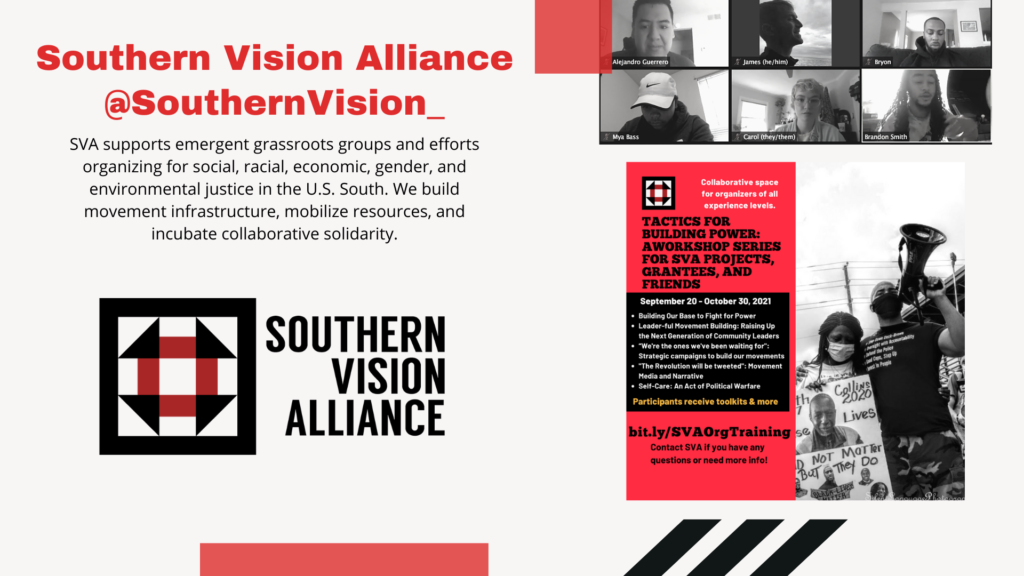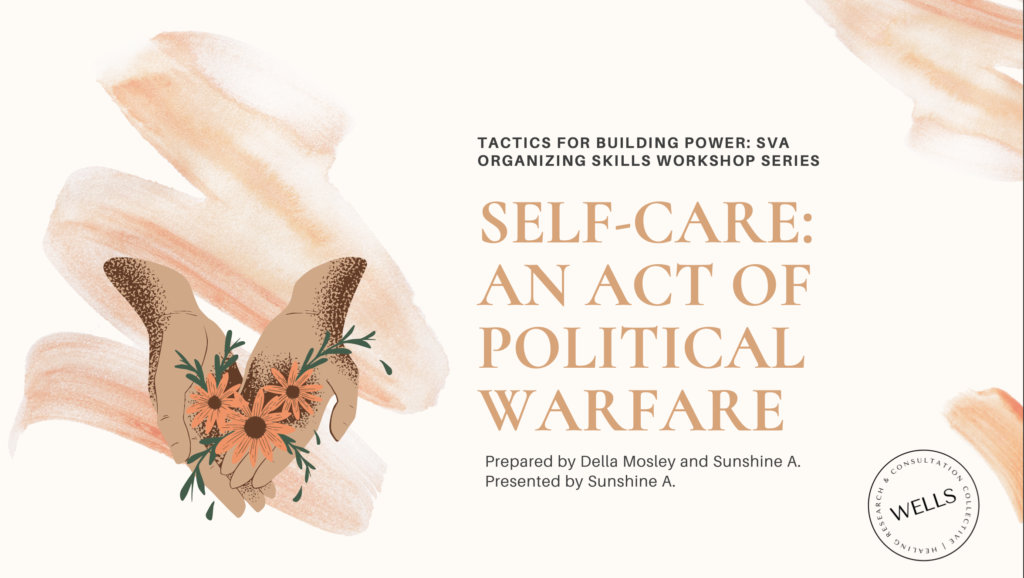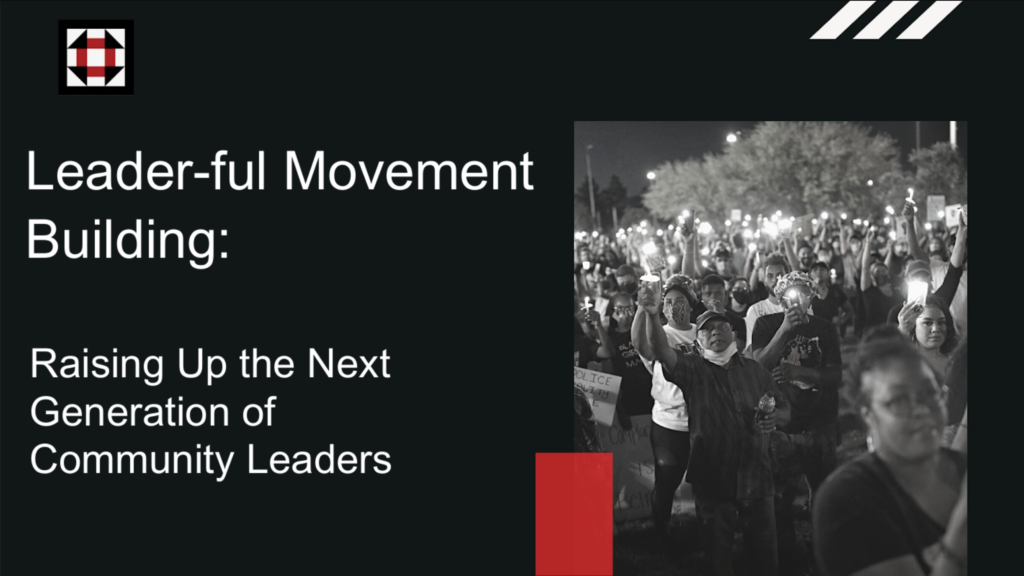
This fall, Southern Vision Alliance hosted “Tactics for Building Power,” a workshop series for our sponsored projects, grantees, and other frontline partners. Over 5 weeks, we welcomed more than 50 participants from groups from across the South—North Carolina, South Carolina, Georgia, Alabama, Mississippi, Tennessee, Arkansas—and beyond. Thanks to all who attended for the lively discussion, peer-to-peer learning, and solidarity!
We convened the series in response to overwhelming requests for nuts-and-bolts training opportunities from partners throughout the SVA network. As we look ahead to 2022, many of us are still grappling with how to return to our in person work in our communities while the COVID-19 pandemic rages on. Across our workshops, we sought to tackle this reality head on and offer tactics for navigating it.
And we built community! As one attendee, Helen Cane, put it, “It was so good to see so many friendly faces! With COVID, it’s been hard to remember the power of just being with other fired-up people gives so much energy and power.”
Coming out of the series, we’ve compiled a recap of each workshop, key takeaways, and responses from grassroots partners.
Organizing Workshop: Building Our Base to Fight for Power by Southern Vision Alliance
Workshop I: Building Our Base to Fight for Power
For our first session, we laid out a framework for defining base-building organizing to build on throughout the series. The workshop tackled a range of topics, including:
- What are organizing and base-building?
- The role of organizers
- How base-building is distinct from other forms of community engagement
- How organizing is oriented toward building power
With dozens of organizers from numerous Southern states participating, the workshop drew out these understandings from folks’ collective experience. Within our shared framework, we discussed base-building organizing as political work that creates and strengthens independent, democratic organizations of the working class. The goal is to develop members into leaders and organizers—regardless of their previous political experience. Base-building is otherwise known as “organizing the unorganized.”
As organizers, our role is to identify leaders within a given community and create venues for these leaders and other community members to develop their skills and analyses, all in the service of shared struggle. Within this framework, we understand that the majority of the working class has no experience with organized political work. We also understand that there are many factors that can hold folks back from engaging in political struggle around their conditions. As such, organizing requires going beyond simple recruitment or a solely mobilizing-focused program to develop leaders who can take increasing responsibility for their own fights. This is done through the creation of durable, independent organizations. These organizations are able to connect with workers experiencing heightened class conflict—against their bosses, landlords, or the state—and provide them with the support to wage those struggles successfully. In the process, organizations can help folks realize that they can change reality through struggle—and that, ultimately, their issues will only be solved with the abolition of capitalism.
Click for PDF Slides
Workshop II: Leader-ful Movement Building: Raising Up the Next Generation of Community Leaders
To build power, we need leaders! Lots of leaders, and lots of kinds of leaders. In this workshop, we asked: How do we identify new leaders? How do we support leaders in their development and help them succeed? How can we build a leader-ful movement that brings all our skills, tricks, and experiences to the table?
We defined leadership as a practice, not a position. We also grounded leadership in a dynamic cycle of “leadership development.” In this cycle, everyone can grow their leadership. It’s on us, as organizers, to give folks opportunities to do so. As the Power Shift Network has put it, “A leader creates conditions that enable others to do great things in the face of uncertainty.” We asked what opportunities folks can create for others to…
- Show support for your campaign or group? (think: petitions, sign-ups, social media)
- Take action or be involved? (think: actions, events, meetings, new member orientations)
- Become an organizer or leader? (think: 1:1 convo with an existing organizer, core leader meetings)
And we talked about equitable leadership development. We asked: What are some leadership traits that are important to you? Are they currently underrepresented or undervalued in any way? If so, how do you want to support or cultivate these traits?
As a tool for thinking through these questions on leader-ful movement building, we shared this worksheet.
Organizing Fellowship: Campaign by Comms Team
Workshop III: We’re the ones we’ve been waiting for”: Strategic campaigns to build our movements
Campaigns are the lifeblood of any organization engaged in base-building organizing. But it’s not always easy to know how and where to get started—or how to tie a campaign to the growth and development of long-term, community-based organizations.
Similar to other workshops in the series, the discussion relied heavily on the experiences of participants to draw out best practices for campaigns in their contexts. The workshop offered strategies for the following:
- How to identify issues among a constituency you’re working with
- How to draw out the steps of building and executing a campaign from there, using democratic and participatory processes including one-on-one conversations and community gatherings
- How to develop demands and identify targets who hold some level of power who these demands can be directed towards
- Tactics that can be employed in a campaign escalation strategy, emphasizing the need to be able to adapt to, and take advantage of, changed conditions
Organizing Fellowship: Media by Comms Team
Workshop IV: “The Revolution will be tweeted”: Movement Media and Narrative
“The revolution will not be televised, it will be tweeted.” How so? Because only we, directly impacted community members, have the language to evoke powerful raw emotions and validate experiences and struggles within our communities. By leveraging narrative tools, we can shift culture and values that were once considered immovable.
This workshop offered best practices for how social media can be a tool for building power and expanding your base of supporters. In breakout room discussions, participants discussed their successes and challenges related to press and media. We also provided space for folks to talk about their current campaign work that could be pitched to press.
As a follow-up tool, we shared our Movement Media Toolkit as a guide for thinking through social media and press strategy.

Workshop V: Self-care: An Act of political warfare
Audre Lorde once wrote: “Caring for myself is not self-indulgence, it is self-preservation, and that is an act of political warfare.”
In the last workshop of the series, we discussed how we can take care of ourselves and prevent burnout—for our own sakes and for the sake of the movement itself.
To facilitate the discussion, we welcomed Sunshine Adam. Sunshine (pronouns they/them) is a Black, queer, Afro-Latinx immigrant from São Paulo, Brazil. In 2021, they earned their Master’s degree at the Center of Gender, Sexuality, and Women Studies Research at the University of Florida. Currently, Sunshine acts as a project manager and an education and healing facilitator for Academics for Black Survival and Wellness, an initiative that aims to move academics towards taking action against anti-Black racism and promote wellness for Black folks. As a proud member of the WELLS Healing and Research Collective, they’ve continued to conduct research centering on the wellness of Black and Afro-diasporic communities.
Sunshine facilitated discussion on collective, personal, and relational wellness. They asked: What is the difference between self care under capitalism and collective care under individualism? How do we move through our fight, flight, or freeze responses? How do we move from coping and surviving to healing and thriving? We learned that there are eight Dimensions of Wellness: emotional, physical, social, occupational, financial, environmental, spiritual, intellectual. In the end, Sunshine led us through creating our own Wellness Wheels, where everyone wrote how they feel well based on the eight Dimensions of Wellness.


